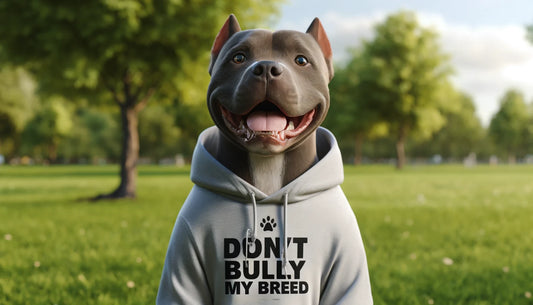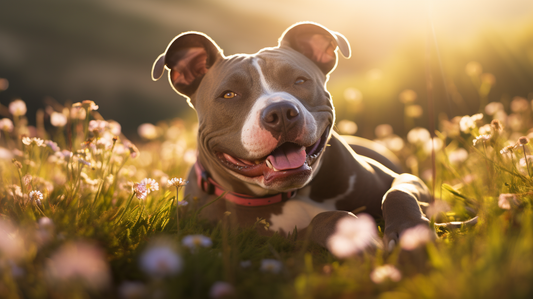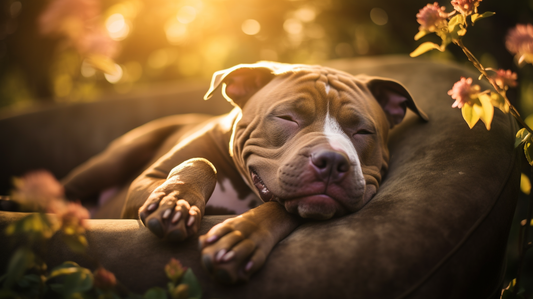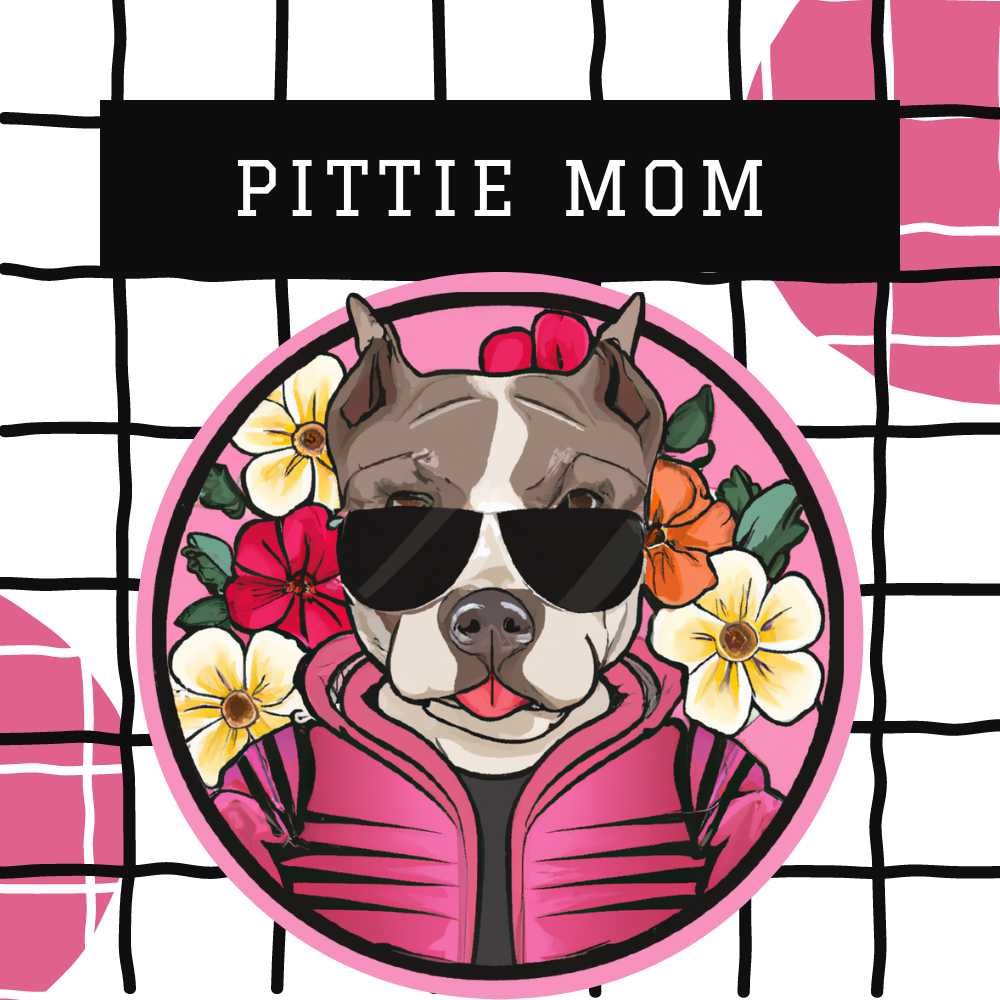All About American Pit Bull Terriers - History Personality and Care Guide
Tom Drachman
Welcome to the world of Pittie Choy, where we celebrate the love and loyalty of American Pit Bull Terriers (APBT). Our brand values are centered around promoting the positive aspects of this amazing breed and dispelling the myths and misconceptions that have unfairly stigmatized them.
As a reader who cares about the welfare of dogs and values loyalty, you understand the importance of learning about different breeds and their unique characteristics. APBTs are a breed that has been misunderstood and misrepresented in the media, leading to negative stereotypes that have followed them for generations.
In this blog post, we will explore the history, personality, and care guide for American Pit Bull Terriers through the lens of the Pittie Choy brand values. We believe that every APBT is deserving of love and respect, and it is our mission to share their story and promote responsible ownership.
Join us as we dive into the world of APBTs and discover what makes them such special and beloved companions. Let's celebrate the love and loyalty of this amazing breed together.
Understanding the Complex History of American Pit Bull Terriers:
The history of American Pit Bull Terriers is complex, and as a brand that promotes the well-being and positive representation of this misunderstood breed, it is important to understand and appreciate their origins.
Originally bred in England during the 19th century, APBTs were created by crossing bulldogs with terriers to create a dog that was strong, agile, and tenacious. The breed was originally used for bull-baiting and ratting, which involved releasing a dog into an arena to catch and kill a rat, and evolved into bull-baiting, which involved dogs being pitted against bulls in fights to the death.
As blood sports were outlawed in England in the 1800s, breeders turned to dog fighting as a new source of entertainment. APBTs were then selectively bred for their fighting ability and aggressiveness, leading to their negative reputation as a dangerous breed.
However, it is important to note that these negative traits were not inherent to the breed and were a result of human intervention. APBTs were used for fighting due to their loyalty, tenacity, and strength, but with proper training and socialization, these traits can be channeled into positive behaviors.
In the United States, APBTs became popular as working dogs and family pets due to their loyalty, intelligence, and affectionate nature. Unfortunately, their association with dog fighting continued to shape public perception of the breed, leading to breed-specific legislation and discriminatory attitudes towards APBTs and their owners.
Today, many organizations and advocates work towards promoting responsible ownership and changing the negative perception of APBTs. As a brand that celebrates the unique qualities and positive contributions of this breed, it is important to acknowledge their history and work towards promoting a brighter future for them.
Harnessing the Unique Personality and Energy of American Pit Bull Terriers:
At Pittie Choy, we believe that every American Pit Bull Terrier (APBT) is unique, with their own personality and temperament. Contrary to popular belief, APBTs are not naturally aggressive or dangerous dogs. They are loyal, affectionate, and protective of their families, and can make wonderful companions with proper socialization and training.
As a high-energy breed, APBTs love to play and exercise, making them great companions for active individuals and families. They are highly intelligent and eager to please, making them quick learners when it comes to obedience training. Positive reinforcement training methods work well with APBTs, as they respond well to praise and rewards.
Early socialization is essential for APBTs, as it helps them develop into well-adjusted and well-behaved dogs. They should be exposed to a variety of people, animals, and environments from a young age to help them develop confidence and social skills.
At Pittie Choy, we advocate for responsible ownership of APBTs, which includes providing them with proper care, socialization, and training. It is important to approach APBTs with an open mind and a willingness to learn about their unique personalities and needs. By promoting positive representations of APBTs and educating the public on their true nature, we can help dispel the myths and stereotypes surrounding this wonderful breed.
Physical Characteristics of American Pit Bull Terriers: Breaking the Stigma and Embracing Individuality:
At Pittie Choy, we celebrate the unique physical characteristics of American Pit Bull Terriers (APBTs), which make them stand out from other breeds. APBTs have a distinct muscular build, which reflects their history as a working and athletic breed. They typically weigh between 30 and 60 pounds and stand around 18 to 22 inches tall at the shoulder. Their short, smooth coat comes in a variety of colors, including black, blue, fawn, and brindle, among others. Their ears are often cropped, and their tails are typically left natural.
It's important to note that while APBTs are often stigmatized due to their physical appearance, their physical attributes alone do not determine their behavior or temperament. At Pittie Choy, we believe in celebrating the unique characteristics of each individual dog and judging them based on their actions, not their appearance.
We also recognize that many jurisdictions have breed-specific legislation (BSL) in place that restricts or bans ownership of American Pit Bull Terriers. While we strongly oppose BSL and believe that all dogs should be judged on their individual behavior and temperament, we encourage potential owners to research local laws and regulations before bringing an APBT into their home.
In the next section of this post, we will discuss the exercise and activity requirements, nutritional needs, common health issues, and grooming and hygiene tips for APBTs.
Top Tips for Keeping Your American Pit Bull Terrier Healthy and Happy:
We believe that caring for your American Pit Bull Terrier (APBT) is an essential part of being a responsible and loving owner. To help you keep your furry friend happy and healthy, we've compiled some key information on exercise and activity requirements, nutritional needs, common health issues, and grooming and hygiene tips for APBTs.
Exercise and activity requirements:
As a high-energy breed, APBTs require regular exercise to stay physically and mentally healthy. Daily exercise and playtime will help keep your dog happy and prevent behavioral issues. APBTs love to run, so giving them space to run and play in a secure, fenced area is important. They also enjoy playing fetch, going on walks, or taking hikes with their human companions. Providing mentally stimulating toys and games can also help keep your APBT mentally engaged.
Nutritional needs and diet recommendations:
APBTs require a balanced and nutritious diet to maintain their health and energy levels. A diet rich in protein and moderate in fat and carbohydrates is recommended for these active dogs. However, it is important not to overfeed your APBT, as they can easily become overweight. Overweight dogs are at risk of health problems, such as joint issues and heart disease. Providing fresh, clean water is also essential for maintaining your APBT's health.
Common health issues and conditions of APBTs:
Like all dog breeds, APBTs are susceptible to certain health issues and conditions. Some of the most common health issues that affect APBTs include hip dysplasia, skin allergies, and dental problems. Regular check-ups with a veterinarian can help detect and treat these issues early on, improving your dog's quality of life. Maintaining proper weight and exercise levels can also help prevent some health issues.
Grooming and hygiene tips:
APBTs have a short, smooth coat that requires minimal grooming. Weekly brushing with a rubber curry brush can help remove loose hair and promote a shiny coat. Regular bathing is only necessary if your APBT gets dirty or smelly, and it's important to use a dog-specific shampoo to avoid drying out their skin. Dental hygiene is also essential for APBTs, so regular teeth brushing and check-ups are recommended. Keeping your dog's nails trimmed can also help prevent overgrowth and splitting.
By following these tips and providing proper care for your APBT, you can help ensure that your furry friend lives a long and healthy life. Remember, a healthy dog is a happy dog, and a happy dog is a happy family!
Training and Socialization: The Key to a Well-Behaved American Pit Bull Terrier
At Pittie Choy, we believe that proper training and socialization are crucial to ensure that your APBT is well-behaved, obedient, and a pleasure to be around. We recommend using positive reinforcement training methods, which involve rewarding desirable behavior with treats, praise, and other incentives, rather than punishing undesirable behavior. This approach not only helps build a stronger bond between you and your APBT, but also encourages your dog to repeat the desired behavior.
APBTs are highly social dogs that thrive on human companionship, and they are loyal and protective of their families. It is essential to expose them to a variety of people, animals, and environments from a young age to help them develop into confident and friendly adults. Early socialization is key to ensuring that they grow up to be well-adjusted and well-behaved dogs. Positive reinforcement training methods are highly effective with this breed, as they respond well to praise and rewards.
We recommend enrolling your APBT in obedience classes or working with a professional dog trainer to ensure that they receive the proper training and socialization they need to be happy and well-behaved pets. These classes can also be a great opportunity to bond with your dog and meet other APBT owners.
It's important to note that some jurisdictions have breed-specific legislation (BSL) in place that restricts or bans ownership of American Pit Bull Terriers. Before bringing an APBT into your home, it is important to research local laws and regulations to ensure that you can legally own one in your area.
At Pittie Choy, we are committed to promoting responsible ownership and positive representations of APBTs in society. We believe that by educating ourselves and others on the importance of training and socialization, we can help change the negative stereotypes and misconceptions surrounding this amazing breed.
APBTs and Society: Addressing Misconceptions and Promoting Responsible Ownership:
At Pittie Choy, we believe that American Pit Bull Terriers (APBTs) are amazing dogs that are often misunderstood due to unfair stereotypes and negative media coverage. While it is true that this breed has a history of being used for dogfighting, it is important to remember that individual dogs should not be judged based on the actions of their ancestors or the actions of others.
Unfortunately, many jurisdictions have enacted breed-specific legislation (BSL) that unfairly targets APBTs and restricts ownership, despite evidence showing that BSL is ineffective at reducing dog bites and can have negative consequences for dogs and their owners. It is important for APBT owners and advocates to speak out against BSL and promote responsible ownership as a better solution to preventing dog bites and promoting public safety.
APBTs can make excellent family pets with proper care, training, and socialization. They are known for their loyalty, affection, and high energy levels. As with any breed, APBTs have specific exercise and nutritional needs, and may be prone to certain health issues. Regular grooming and hygiene care can also help keep them healthy and happy.
Training and socialization are crucial for APBTs, as they can help prevent behavioral issues and promote positive interactions with people and other animals. Positive reinforcement training methods are effective with this breed, as they respond well to praise and rewards.
At Pittie Choy, we are dedicated to promoting positive representations of APBTs and advocating for responsible ownership. By educating ourselves and others about this amazing breed, we can help change negative stereotypes and misconceptions and promote a better understanding and appreciation of APBTs.
In conclusion, American Pit Bull Terriers are a special breed that deserves our love and respect. While they have faced unfair stigmatization and legal challenges, they remain a beloved and loyal companion to many. We encourage our readers to educate themselves about APBTs and to promote responsible ownership. By advocating for APBTs and supporting positive representations of this breed, we can help change the narrative and show the world the amazing qualities of these wonderful dogs.
Our call-to-action is simple: share this post with your friends and family, and continue to advocate for APBTs in your community. Let's work together to give these amazing dogs the recognition and love they deserve.






